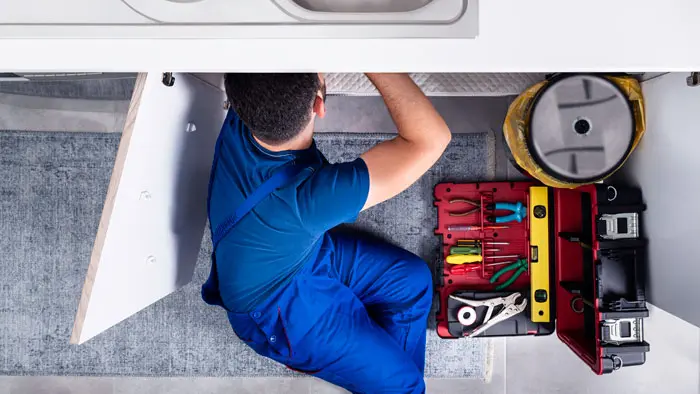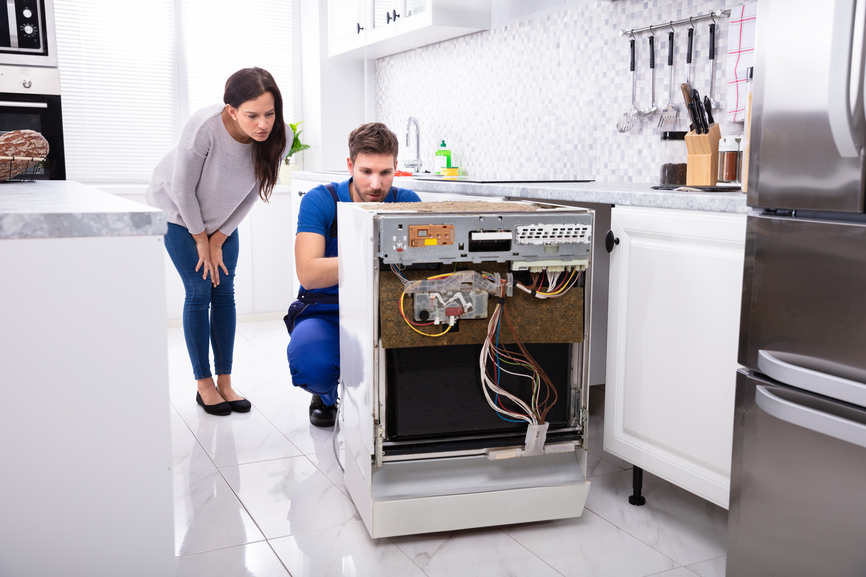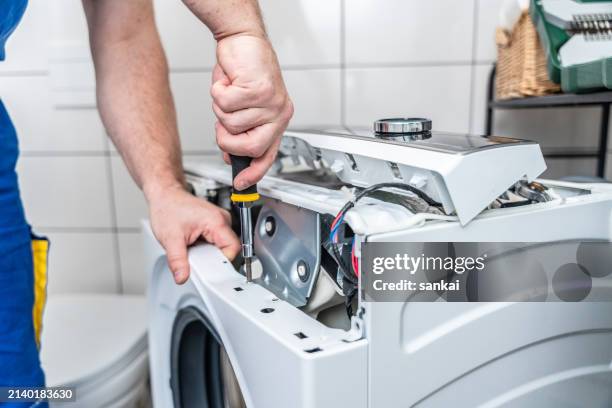How to Stop Your Washer from Shaking – Maytag Washing machine repair Dependable Refrigeration & Appliance Repair Service
How to Stop Your Washer from Shaking – Maytag Washing machine repair Dependable Refrigeration & Appliance Repair Service
Blog Article
The Ultimate Guide to Comprehending Appliance Repair at Home
When your fridge quits cooling down or your stove refuses to warm, it can really feel overwhelming. Understanding appliance repair at home can conserve you time and money. You'll learn to identify signs and symptoms, make use of vital tools, and follow an organized troubleshooting procedure. Yet before you begin, there are crucial safety and security preventative measures you require to take right into account. What are the most common issues, and how can you repair them? Let's discover the essentials.
Usual Appliance Troubles and Their Signs
When your appliances start acting up, it's vital to identify the indicators at an early stage. Ignoring them can result in bigger issues and costly repairs. As an example, if your refrigerator isn't cooling down properly, you might discover warm spots or condensation forming. This might show a stopping working compressor or an obstructed vent.Your dishwasher may reveal issues through unclean meals or unusual sounds during cycles. If you listen to grinding or clanking, it's time to investigate.A cleaning device that won't spin or drain pipes can leave you with soggy laundry, recommending a clogged up drain or a malfunctioning pump.Lastly, if your oven's temperature seems off or it takes permanently to preheat, you may be dealing with a damaged thermostat. By remaining sharp to these signs, you can address issues before they escalate right into significant fixings.
Vital Tools for Device Repair
When you're dealing with appliance repair services in your home, having the right devices is crucial. Fundamental hand tools like screwdrivers and pliers will help you dismantle and fix various home appliances, while electric screening tools guarantee you're functioning safely with circuitry. Let's discuss what you require to start on your repair service trip.
Standard Hand Devices
Having the right tools is vital for reliable device fixing at home. Start with a reputable screwdriver collection, including both flathead and Phillips types, as screws are usual in home appliance setting up. Pliers are likewise crucial; they assist with gripping, turning, and cutting cables or tiny components. A pair of needle-nose pliers can get to tight spots conveniently. You'll need an excellent adjustable wrench for tightening up or loosening nuts and bolts. An utility blade comes in handy for puncturing product packaging or insulation. Ultimately, do not neglect a sturdy workbench or surface to securely arrange your devices and components. With these basic hand devices, you'll be well-prepared to tackle most appliance repairs that come your way.
Electrical Screening Gadgets
Together with standard hand tools, electric screening gadgets play an important duty in device repair work. These tools aid you identify electrical problems and assurance devices work safely. A multimeter is crucial; it gauges voltage, current, and resistance, permitting you to pinpoint problems promptly. A non-contact voltage tester is another essential, allowing you discover live cables without making straight get in touch with, improving your security. Secure meters are excellent for gauging existing circulation in wires without separating them, conserving you effort and time. In addition, circuit testers can quickly examine if outlets are working properly. By utilizing these devices, you'll improve your troubleshooting process and enhance your repair work abilities, making device upkeep a great deal easier.
Step-by-Step Overview to Diagnosing Device Issues
When your appliance breaks down, it can be aggravating, but diagnosing the concern doesn't need to be overwhelming. You'll discover to recognize typical troubles and apply efficient repairing strategies. Allow's stroll through the steps to get your home appliance back in functioning order.
Usual Device Troubles

Repairing Techniques Explained

Fixing Major Kitchen Area Home Appliances: A Closer Look
Have you ever before wondered exactly how to take on usual problems with your kitchen home appliances? Fixing significant kitchen area appliances like fridges, stoves, and dishwashers can be easier than you assume. Begin by recognizing the problem-- whether it's a fridge not cooling or an oven that won't heat up. Frequently, an easy reset or checking the power resource can resolve the issue.For refrigerators, tidy the condenser coils and inspect the door seals. If your stove's not article source home heating, inspect the burner and thermostat. Dishwashers could simply require a clean filter or a reset to obtain them back in activity. Always unplug the home appliance prior to diving into repairs to guarantee your safety.Don' t fail to remember to speak with the user handbook for specific fixing ideas associated with your model. With a bit of persistence and the right tools, you can confidently deal with device fixings and conserve cash while doing so!

Troubleshooting Laundry Equipments: Tips and Techniques
When your laundry devices start breaking down, it can really feel overwhelming, however fixing them does not have to be a trouble. Start by checking the power supply. Validate the home appliance is plugged in and the electrical outlet is operating. Next off, check the door or cover button; a defective button can protect against the machine from operating.For washing machines, if it's not rotating, look for out of balance tons. Rearranging the clothes may solve the problem. If your clothes dryer isn't heating, clean the lint filter and inspect the air vent for blockages.Listen for uncommon sounds; they can indicate a trouble. If your home appliance is leaking, inspect the hoses for splits or loosened connections. Document any kind of mistake codes shown on digital screens, as they can assist you in determining the issue. Finally, seek advice from the user handbook for specific fixing suggestions related to your model.
Safety Preventative Measures to Take Throughout Repairs
Prior to you begin any appliance repairs, it's vital to prioritize safety to avoid accidents or injuries. First, disconnect the appliance or turn off the breaker to ensure no power reaches it while you work. Usage shielded tools to minimize the risk of electrical shock. Use security goggles and gloves to safeguard on your own from sharp edges or debris (Dryer repair Oro Valley Dependable Refrigeration & Appliance Repair Service).Make particular your workspace is tidy and well-lit, so you can see what you're doing. Maintain kids and pets far from the area to prevent disturbances and possible threats. If you're handling gas home appliances, be extra mindful; check for leakages prior to proceeding.Take your time, and do not rush via repair work. If you feel uncertain regarding any kind of action, it's far better to stop briefly and research than to guess. Complying with these safety measures will certainly help develop a more secure setting for your do it yourself appliance repair job
When to Call a Specialist for Aid
How do you know if it's time to call in a specialist for home appliance repairs? If you have actually tried fundamental troubleshooting without success, it's a clear indication. If your home appliance still will not begin or shows uncommon sounds after resetting it, do not think twice to look for professional help.When you notice leakages, smoke, or melting smells, prioritize safety and security whirlpool refrigerator repair and call a pro immediately. These problems can cause even more considerable damages or posture dangers to your home.Also, if your device is under warranty, speaking to an expert is typically the ideal course. They can ensure that fixings will not void your warranty, conserving you cash in the lengthy run.Finally, if you're unclear or uncomfortable with complex repair services, it's a good idea to leave it to the specialists. Bear in mind, dealing with complex concerns without the best experience can result in expensive mistakes. Trust an expert when doubtful!
Often Asked Inquiries
Exactly How Can I Avoid Home Appliance Problems in the Future?
To avoid appliance issues in the future, you ought to carry out normal upkeep, look for wear and tear, clean filters, and avoid overloading. Remaining positive will assist extend their lifespan and maintain them running efficiently.
What Are one of the most Typical DIY Appliance Repair Service Mistakes?
You could overlook safety preventative measures, miss repairing actions, or use inaccurate devices when trying DIY appliance repair work. Hurrying the procedure or neglecting supplier guidelines can bring about more considerable concerns and pricey mistakes. Remain individual and informed!
Exactly how Do I Know if a Component Needs Replacement?
You can tell if a part requires substitute by looking for uncommon sounds, leakages, or irregular performance. If the device struggles to run correctly or shows visible damage, it's most likely time for a replacement.
Can I Use Generic Parts for Appliance Repair Works?
Yes, you can utilize generic parts for appliance repairs, yet determine they work - Dependable Refrigeration & Appliance Repair Service Washer repair near me. Generic components might save you money, but they might influence efficiency or dzedos durability, so evaluate your choices carefully prior to making a choice
What Guarantees Cover Home Appliance Repair Works?
Most device service warranties cover repairs for making flaws, however they commonly omit damages from abuse. Check your service warranty terms carefully, as some may need using certified specialists and initial parts for insurance coverage to remain legitimate.
Report this page